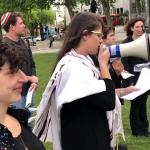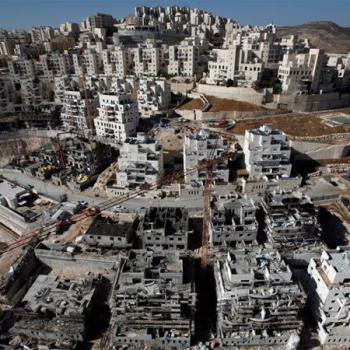Dear Ed Husain
I’ve just finished reading your new book ‘The House of Islam’, and like your autobiographical debut ‘The Islamist – Why I Joined Radical Islam in Britain, What I Saw Inside and Why I Left’, it’s going to be a bestseller.
There’s much to welcome in your new work, in particular your strong critique of Salafi-Whahhabi beliefs which have fueled al-Qaeda, ISIS, Boko Haram and others to commit brutal and murderous crimes. But when it comes to your criticism of Muslim support for the Palestinians you get things badly wrong. Not only do you omit vital historical context and international law, you also undermine your own call for a compassionate, tolerant and moderate Islam.
My concern is that your take on Israel abandons the Palestinian people and stigmatises young British Muslims for supporting Palestinian rights. Meanwhile, you give Israel a blank cheque to continue on its chosen path of legalised and cultural discrimination. All of which will only fuel the real Islamic extremism which you book opposes so clearly.
I’m writing to you because I recognise that both of us are grappling with how and why the faith traditions that raised us can take bad turnings. We both want to guide our communities to a better place. That better place cannot be one that uses theological interpretations and nationalist creeds to justify the oppression of others. There is now widespread Jewish dissent over Israel, and Zionism itself, and I hope the knowledge of this growing dissent will make you realise that support for Jews does not require an automatic support for Israel. Neither should support for Israel be the entry ticket to Islamic ‘respectability’ either on college campuses, political think tanks or the corridors of power.
A benign Zionism
You begin your chapter ‘The Jews’ with accounts of the favourable co-existence between Muslims and Jews in Islamic society from the days of Prophet Muhammad onwards. However, as you come to modern times, your presentation of the history of Zionism, Israel and recent Jewish thought is considerably less assured.
You write about Jews “leaving their homelands and congregating in Israel” and how this has not created security for them. You go on to describe today’s “rivalry” and “hatred” between Arabs and Jews despite such common ground in our faith and traditions. But you provide no context for the establishment of Israel or how this Jewish state took the place of an indigenous Arab Muslim and Christian people who had been the majority in the land for a thousand years and more. Elsewhere in your book you write in detail about a 100 years of “humiliation” brought to the Muslim Middle East by European Colonialism. But the Zionist form of Settler Colonialism, wrapped in religious texts, gets a free pass from you.
Without including the story of the forced displacement of Palestinians by Zionist settlers, the hostility of Muslims towards Jews will look just the same as Christian hostility towards Jews in Europe. But it’s a very different story. And that difference has to be understood.
Zionism and the creation of the modern Jewish State of Israel was not an innocent endeavor of “congregating in Israel”. Zionism had victims and continues to have victims. If you are a Palestinian Muslim, it’s not a story of “rivalry” and “hatred” but of Jewish colonialism and Palestinian dispossession.
Conflation
Your benign presentation of Zionism uses the same sleight of hand favoured by most rabbis. You explain Zionism as being no more than an expression of long held Jewish thinking. “The word Zionism,” you say, “comes from Mount Zion in Jerusalem, which symbolises the Holy Land for Jews. It should do so too for Muslims”.
This explanation of Zionism reminds me of the Muslim clerics you criticise elsewhere in your book for their narrow literalist interpretations of the Qur’an. Like today’s rabbis, and some Islamic clerics, you too are conflating religious ideas with political ideologies which then create a justification for oppression and violence and the conquest of land.
While you often point out current Muslim thinking that ignores older traditions, you fail to report how today’s rabbis have also forgotten long-standing Jewish objections to Zionism which viewed it as a secular, socialist project totally at odds with traditional rabbinic thought on the nature, purpose and ending of ‘Jewish Exile’.
Category confusion
You then accuse some Muslims of forgetting how the Qur’an repeatedly honours “the people of Israel” as if the Jews mentioned in the Qur’an and Hebrew Bible are synonymous with the modern State of Israel. It’s the same category confusion that Christian Zionists make which leads to two thousand years of Jewish history and religious thought being seen as merely a temporary derailment from the Jewish people’s national destiny.
You acknowledge that Palestinians also have a right to a home in the Holy Land and that they should not be “languishing in refugee camps”. But you offer no explanation as to why they are in refugee camps, or why they are not allowed back to their homes by the State of Israel.
The reason is simple. Israel has never wanted to share the land. Why else would there be a ‘Right of Return’ for Jews who have never lived there but no right of return for Palestinians who were forced to flee their homes only 70 years ago and have international law on their side?
This is not a battle between two ancient tribes who must learn to get along with each other. This is a dynamic of oppressed and oppressor. Failing to acknowledge the history and current power relations between Israeli Jews and Palestinians creates an environment of public debate where those who support the rights of Palestinians and their right to resist occupation, annexation and blockade find themselves labeled one-sided, extreme, and even dangerous by politicians and domestic security agencies.
Sadly, your reluctance to provide context only gets worse as the chapter goes on.
Settlements, boycotts and antisemitism
When it comes to talking about the West Bank Settlements and their impact on the Palestinians, your assessment is worthy of the best exponents of Israeli hasbara (propaganda).
You write that “Many people condemn the Israeli Settlements and call for an economic boycott of their produce, but I saw that it was Arab builders, plumbers, taxi drivers and other workers who maintained the Israeli lifestyle.” You present this as a positive advance for Palestinian livelihoods and the wider Palestinian economy. But it’s nothing of the kind.
The Settlements do not represent an example of Israeli/Palestinian economic and social integration. The reverse is true. Palestinians have become casual agricultural labourers and builders with minimal employment rights working in Settlements because other job options no longer exist. Their farmland and their future was stolen from them.
And of course the Palestinians cannot make their homes in the Settlements or drive on the roads that connect them. They are bussed in daily. This is Apartheid pure and simple. So why wouldn’t you boycott it?
Instead of recognising the discrimination, you go on to accuse British students and academics who support boycotts (even if only aimed at the Settlements) as being antisemitic: “the virus of anti-Semitism finds a hospitable home on university campuses, [and creates] an ethos in which young Muslim activists are made to feel that anti-Semitism is perfectly acceptable”.
Why are you stigmatising a non-violent protest against Apartheid in the West Bank, and arguably in Israel itself? What makes a protest called for by the Palestinians themselves against legalised discrimination so completely unacceptable to you?
And then, in a sentence that staggered me by its hypocrisy, you ask your readers: “Is there a Gandhi or Nelson Mandela who can lead Palestine to making peace with its neighbour?” when a few paragraphs before you have just excluded as illegitimate the very tactic which both men used to win the liberation of their people – boycotts.
Palestinian Gandhis and Mandelas certainly exist, in all likelihood they’re locked up in Israeli prisons. It’s the same approach to ‘security and peace’ practised by the British and South Africans in their own time of maintaining an infrastructure of oppression.
You blame the Arab boycott of Israel and BDS support of Muslims in Britain and the West for stifling the Palestinian economy. That’s far from the assessment of the World Bank or the United Nations. Both organisations see the Occupation and Settlements in the West Bank and the blockade of Gaza as the major obstacles inhibiting Palestinian economic growth. Why blame everyone for the condition of the Palestinians apart from the most obvious candidate, Israel?
Gaza and Jihadis
You write disparagingly about the “mass protests across the Muslim world” when Israel “conducts military operations in Gaza against Jihadists lobbing rockets at its population”. Nowhere do you mention Israel ten-year economic blockade of Gaza and the economic and health crisis it’s caused. Is none of that relevant to the story? The protests around the world, particularly in 2008/9 and 2014, were prompted by the gross lack of proportionality in Israel’s behaviour. The Israeli response to “lobbing rockets” led to the death of many thousands of Palestinians, the vast majority of them non-combatants, including women and children, and the destruction of homes and civic infrastructure. I would characterise objecting to this as an expression of compassion rather than an act of support for Jihadists.
It’s impossible to understand the rise in antisemitism in Western Europe without recognising the hostility created by the State of Israel and its treatment of the Palestinian people. That doesn’t excuse antisemitism expressed by Muslims, Christians or anyone else. It certainly doesn’t justify Jihadis killing Jews or attacking synagogues or Jewish restaurants or kosher supermarkets. However, telling young Muslims that they have no good reason to be critical of Israel, or the Zionist ideology that sustains it, will not make the situation better. An honest reckoning of responsibility will.
Jewish biblical literalism
Zionism is Judaism’s own version of biblical literalism, exclusivity, ethnic intolerance and extreme nationalism. Just as within Islam, there’s a thousand years of religious interpretation that has put the brakes on this kind of thinking in the past.
As your book makes clear, the ‘House of Islam’ has many rooms and the largest of them are far from being Jihadist. Within Judaism however, Zionism has become mainstream, which makes it far harder to challenge. I’m not saying Jews are all busy beheading unbelievers or destroying ancient sites of civilization. That’s not the parallel I’m making. But Judaism, Jewish thinking and the Jewish condition itself have undergone profound changes in the last 70 years.
The long-term consequences of the Holocaust have played a large part in the changes. So too has the dogmatic belief that Israel’s creation was a miraculous redemption and is now an existential necessity that makes all other ethical considerations secondary. As a community, we have not yet understood the magnitude or moral implications of our changed situation. We are no longer the “beleaguered minority” that you describe in your book. We have become privileged and empowered.
I can see how your overwhelming priority is to discredit Jihadist thinking and behaviour. But on Israel/Palestine that’s taken you down a road that’s led to your wholesale acceptance of Israel’s security narrative in which Israeli Jews remain the eternal victims of irrational hatred and Israel is blameless for what’s happened to the Palestinian people. Any objection to this narrative is quickly branded antisemitism and you’ve chosen not to challenge this despite the experience of both Muslim and Christian Palestinians.
A better way to talk
You’re right to condemn the language of “wiping Israel off the map” or “throwing Jews into the sea”. That gets us nowhere. Using the Palestinians as a rallying cry for Islamic extremism does them no favours either. Thankfully, there is a better way to talk about all of this.
The Islam of compassion and tolerance which you call for, cannot tolerate racism and discrimination or be compassionate towards the powers that enable it. And that includes the racism and discrimination practiced by Israel and defended by its advocates around the world. Calling this out shouldn’t brand you dangerous or extremist. Defending it should. Challenging the boundaries of acceptable debate on Israel is what’s needed right now rather than joining a rhetoric that perpetuates injustice.
We can speak positively about Islam and Judaism without becoming a defender or apologist for anyone’s ethnic or religious exclusivity or violence. Muslims, Christians and Jews in Israel/Palestine will never have peace until all who call the land ‘home’ have equal rights. That’s what any compassionate and tolerant religion must look like. Isn’t that the message that Muslims, Christians and Jews need to hear?
Sincerely,
Robert Cohen












